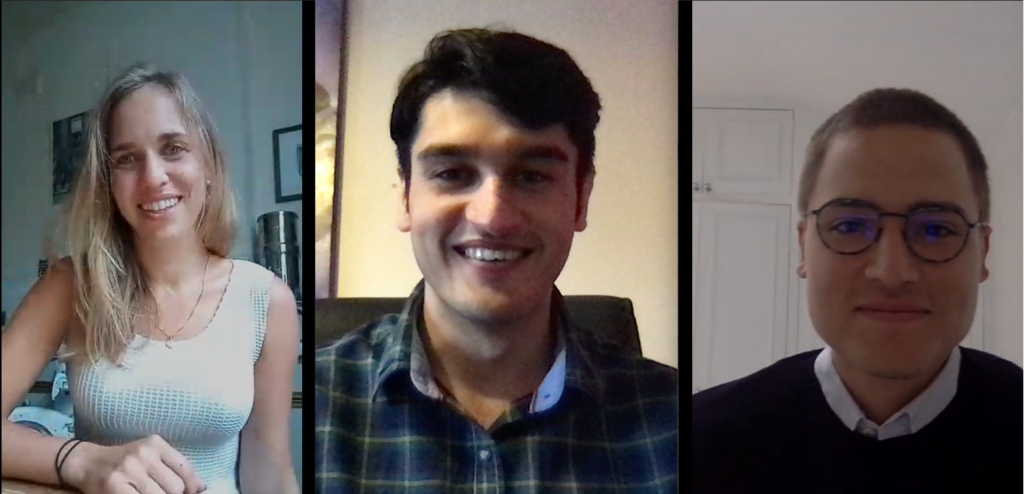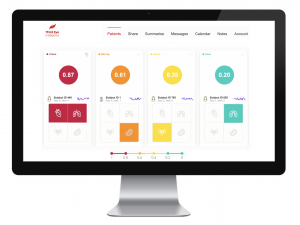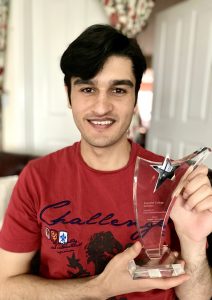 It’s been almost a month since Imperial PhD student Sam Tukra won IGHI’s Student Challenges Competition (SCC).
It’s been almost a month since Imperial PhD student Sam Tukra won IGHI’s Student Challenges Competition (SCC).
His healthcare innovation, Third Eye Intelligence, an artificial intelligence (AI) driven platform that predicts a patient’s risk of organ failure impressed the competition judges. Sam’s pitch earnt him the top prize of £10,000. But behind every start-up, there is a journey full of twists and turns.
Searching for answers
Sam’s idea was born out of tragically losing his grandfather to multi-organ failure in a hospital in India. After suffering a heart attack, Sam’s grandfather was admitted to the intensive care unit (ICU):
“My grandfather had other conditions before this. But I couldn’t comprehend how a person could be admitted to hospital with a heart attack, and then pronounced dead quickly after due to multi-organ failure,” said Sam.
Sam set out to understand why more couldn’t be done to help such patients like his grandfather. This was the start of Sam’s search for a solution.
“In this particular hospital in India, there were only a handful of doctors but over 30 patients to take care of in intensive care. For patients in intensive care and the doctors treating them, time is limited,” said Sam.

Innovating step-by-step
Sam delved deeper into this issue. ICUs gather patient data, such as scan results and data on the body’s main functions, known as vital signs, but it wasn’t analysed due to the sheer amount of it. He felt a solution could be designed to improve patients’ outcomes with this existing data.
Using his background in artificial intelligence, data understanding and predictive analytics, Sam began to build an early warning detection platform: “I looked into whether I could predict what will happen to a patient with one type of signal, such as heart rate. Then I added more signals and more data to develop the system.”
In Sam’s research, he found that any existing algorithms for predicting organ failure tended to only use one type of data, such as imaging.
“I realised that doctors don’t just look at just one thing to see what’s wrong with a patient. They look at multiple pieces of data such as interventions, blood test results and previous patient history. All these factors come into play. But there was no single AI algorithm considering this because it’s hard to design.”
Although a difficult task, Sam created an algorithm that brings together existing patient information, including current medical issues, past records, medication history and vital signals. Using this information, the algorithm produces a score indicating the likelihood of the patient’s condition deteriorating. If this score is above a certain range, it raises an alarm to the clinician which allows them to quickly intervene in early heart, lung or kidney failure.
A balancing act
After creating the algorithm, Sam’s next step was to test it. As an independent researcher, Sam applied to access a 46,520-patient data set from the Massachusetts Institute of Technology.
But before he could test his platform, Sam needed to ensure he had all the necessary equipment and tools to run these experiments. As a PhD student, financing this was a struggle.
“AI requires some serious computing firepower. I had my PhD stipend coming in, but the majority of it was spent on living costs.
“I worked on my PhD during the day and did contract work after that. This helped me finance the courses I had to undertake to obtain the license for the data set and develop the computing power to run these experiments. This was essentially my life for 6-7 months,” said Sam.
Fortunately, Sam’s sacrifices are paying off having invested in the computing power to run experiments with his platform.

Looking ahead
To strengthen his innovation, earlier this year Sam recruited two new team members to Third Eye Intelligence. Dr Marta Kedrzycki, a clinical research fellow at IGHI’s Hamlyn Centre offering her experience of working as a clinician on ICU wards and MSc Innovation student, Luca Meise who assists with the business development of the platform.
As well as winning £10,000 at the SCC, Third Eye Intelligence received £10,000 from Imperial’s Venture Catalyst Challenge in the robotic and AI track. They also won an additional £7,000 through Imperial Business School’s Ideas to Impact competition. This funding will help Sam recruit additional engineers to develop his platform into a prototype.
Sam believes that studying at Imperial encouraged him to take part in these opportunities.
“I was just a student setting out to be a researcher. Originally, I didn’t plan to step into the entrepreneurial world. In the beginning, I just wanted to solve a problem. The very fact that Imperial fosters this curiosity-based learning has been exceptionally valuable.”
Third Eye Intelligence has only existed for approximately 16 months, but Sam has made significant progress after completing the testing for his platform and moving towards creating a prototype. Yet he insists that for any budding student innovator, taking time to understand the need for their innovation is his most important piece of advice after his experience:
“It’s a patience game. Take your time to understand your idea. Try to dig deeper. Eventually, you’ll realise you’re being taken into a direction that you will feel so confident about.”